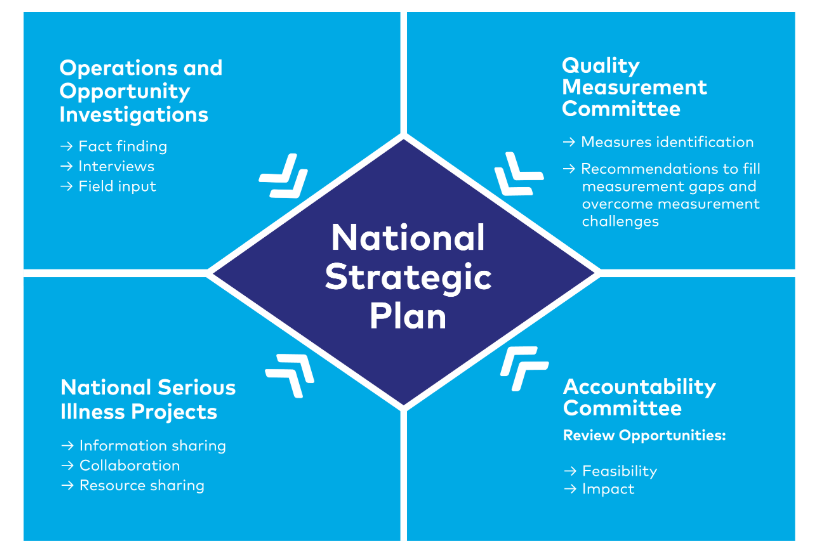Driving Consistent Access to High-Quality Care for People Living with Serious Illness
The Serious Illness Quality Alignment Hub (“The Hub”) is a three-year project gathering leaders in the field of palliative care together with payers, policy makers, and quality management leaders, working to ensure that all people living with serious illness receive high-quality care that optimizes quality of life. The Hub is generously supported by the Gordon and Betty Moore Foundation and coordinated with the National Quality Forum. At the midpoint of the project, we offer reflections on the work thus far, and suggest where efforts may intensify going forward.
Seeking Systematic Change in Our Health Care System
At least 12 million adults, and more than 400,000 children in the United States are currently living with one or more serious illnesses, and these numbers will only rise as the country’s demographic profile continues to age. Yet despite extensive interaction with our health care system, a majority of this population is experiencing inadequately treated symptoms, fragmented and poor communication with their many doctors and nurses, and enormous strain on family members and other caregivers. While the lucky few do have access to interdisciplinary palliative care teams, such access still remains the exception rather than the norm. This lack of access persists, despite a growing and consistent body of evidence demonstrating that palliative care leads to better quality of life and quality of care–and, as a result of this support, marked reductions in preventable hospitalization and unnecessary cost.
There are now increasing opportunities to change the norm of health care delivery for people living with serious illness. In October 2018, the National Consensus Project released the 4th edition of the Clinical Practice Guidelines for Quality Palliative Care, expanding applicability to all care settings and all clinicians. A growing recognition of the quality and business case for palliative care has fueled the growth of community-based palliative care delivery, with at least 2,500 sites of care outside of hospitals. Several major projects are now underway to develop new quality metrics, patient and family surveys, and other resources that can encourage meaningful changes in care delivery for the population living with serious illness. The Hub was developed to coordinate and coalesce these many efforts, working to strengthen incentives and requirements on health care providers. In other words, The Hub aims to transform palliative care from a “nice-to-have” to a “must-have” for the U.S. health care system.
The Hub aims to transform palliative care from a “nice-to-have” to a “must-have” for the U.S. health care system.
How Does "The Hub" Change the Norm?
The Hub has been reviewing a broad range of levers that can drive accountability for access to quality palliative care in the health care system. Potential opportunities include:
- Expanding new Medicare payment and delivery models that support and incentivize high-quality care for beneficiaries with serious illness, such as the Oncology Care Model, the Medicare Care Choices Model, and a new advanced alternative payment model under consideration at the Centers for Medicare and Medicaid Innovation (CMMI), specific to the population with serious illness (not dependent on prognosis)
- Accreditation and certification program standards and measures, and opportunities to incentivize and/or require access to quality palliative care as a condition of accreditation or certification
- State regulation and legislation, including replication of favorable policies in pioneering states
- Medicare value-based purchasing and public reporting programs, especially those that apply to hospitals, skilled nursing facilities, and certified home health agencies
- Incentives and requirements palliative care training and competencies for clinicians in order to be included in the provider networks of health insurance plans and accountable care organizations
- Other areas of influence, such as oversight and quality ratings of Medicare Advantage plans and the role that health care purchasers can play (see more below)
These investigations are one of four efforts managed under The Hub (outlined in the image below). The Hub is also coordinating more than eleven active projects in the field—which include the creation of new quality measures, new patient experience surveys, and new case studies in accountable care organizations—as well as gathering thought leaders in both Quality Measurement and Accountability Committees to review and advise on the most promising options for driving accountability of access to quality palliative care. These efforts will culminate in October 2019, when The Hub will gather leaders from over thirty national organizations participating on the project, to come to an agreement on the highest impact and most feasible opportunities for embedding access to quality palliative care. The resulting national strategic plan will rank priority actions based on both feasibility and impact, and develop a plan to bring these possibilities to reality, as outlined below.

Key Opportunities Already Identified
Among the most important insights from year one of the Hub’s work is that there are already incentives to deliver quality palliative care in place, but more work is needed to help health care organizations “connect the dots” between what they are currently held accountable for, and what consistent palliative care approaches—for their patients living with serious illness—can deliver. This means educating clinicians across all specialties in core palliative care skills, and increased access to support from specialist-level palliative care teams, as needed.
A prime example is the publicly reported star rating quality program for Medicare Advantage (MA) plans (private health insurers that cover all Medicare benefits for Medicare beneficiaries who enroll in their plan). These measures include performance on unplanned hospital admissions, readmissions, grievance and appeals rates—all areas where a consistent high-quality palliative care program can improve performance. Too few MA quality management professionals understand how a strong palliative care program can improve their performance on these existing measures.
Thus, one of the key opportunities that has emerged from the investigations and Accountability Committee discussions is more extensive education and technical assistance for health plans, accountable care organizations, and health care purchasers. By educating the right actors in the healthcare system, and helping them to understand how high-quality care for people living with serious illness can directly improve their performance on mandatory quality measures, we can drive a good deal of the change we are seeking. In fact, this strategy of “making the case” was instrumental in driving the adoption of palliative care in acute care hospitals.
By educating the right actors in the healthcare system, and helping them to understand how high-quality care for people living with serious illness can directly improve their performance on mandatory quality measures, we can drive a good deal of the change we are seeking.
Making the case and implementation education is a high-impact strategy for the following three areas:
- Purchasers of health care services: Employers, unions, and Medicaid state plans can demand high-quality programs and services for their plan participants living with serious illness. Foundational to education efforts, The Purchaser Toolkit for Serious Illness Care Strategies was developed by Catalyst for Payment Reform and CAPC, as an element of Hub activities.
- Health insurance plans: Pioneering health insurance plans have proven that they can standardize the care of their members living with serious illness through specific network quality efforts that include access to home-based palliative care programs and communication skills training initiatives. Presentations, publications, and other channels can disseminate these best practices which already exist for health plans.
- Accountable care organizations (ACOs): A growing body of evidence and an increasing number of exemplar ACOs can be leveraged to educate other value-driven organizations throughout the country.
To ensure consistency and reliability across organizations, The Hub will be finalizing a set of recommended metrics that can be used by purchasers, health insurers, and ACOs to hold themselves and their palliative care teams accountable for high-quality care consistent with national guidelines. The Hub will also be advancing structure and process measures for hospitals and skilled nursing facilities based on the palliative care metrics incorporated into Anthem’s Q-HIP program that provides financial rewards for achieving quality targets.
State policy is a prime opportunity
Another key opportunity that is emerging from the investigations and discussions lies in state policy. States can use both their regulatory authority—their oversight of health care providers—as well as their control of Medicaid benefits to ensure access to palliative care services that meet national guidelines. One interesting example comes from Maryland, where access to interdisciplinary palliative care teams is mandatory in hospital regulations:
“Acute general hospitals and special hospitals with a minimum of 50 beds or more must operate a facility-wide palliative care program to provide related services to patients with serious illnesses. Maryland Code requires hospitals to inform patients and families about these programs, and specifies staffing standards, the types of required services, and care delivery standards.”
The National Academy for State Health Policy has identified promising palliative care legislation and regulation from across all fifty states, and has gathered a group of state policy leaders to advise on feasibility and impact of replication in other states. To supplement this work, CAPC will also be investigating existing barriers to palliative care access in state legislation and regulation (such as hospice licensure rules that limit their ability to provide non-hospice palliative care). Depending on findings, state policy efforts might also focus on eliminating barriers as well as disseminating best practices.
As noted, these and other opportunities will be considered in the national strategic plan aimed at standardizing access to quality palliative care across the U.S. health care system. We look forward to sharing additional insights as the plan is created. For additional information or questions about The Hub, please contact Allison Silvers at [email protected].

